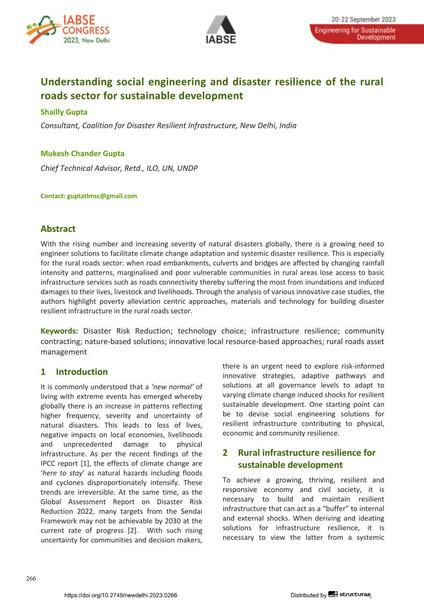Understanding social engineering and disaster resilience of the rural roads sector for sustainable development

|
|
|||||||||||
Bibliographic Details
| Author(s): |
Shailly Gupta
(Consultant, Coalition for Disaster Resilient Infrastructure, New Delhi, India)
Mukesh Chander Gupta (Chief Technical Advisor, Retd., ILO, UN, UNDP) |
||||
|---|---|---|---|---|---|
| Medium: | conference paper | ||||
| Language(s): | English | ||||
| Conference: | IABSE Congress: Engineering for Sustainable Development, New Delhi, India, 20-22 September 2023 | ||||
| Published in: | IABSE Congress New Delhi 2023 | ||||
|
|||||
| Page(s): | 266-273 | ||||
| Total no. of pages: | 8 | ||||
| DOI: | 10.2749/newdelhi.2023.0266 | ||||
| Abstract: |
With the rising number and increasing severity of natural disasters globally, there is a growing need to engineer solutions to facilitate climate change adaptation and systemic disaster resilience. This is especially for the rural roads sector: when road embankments, culverts and bridges are affected by changing rainfall intensity and patterns, marginalised and poor vulnerable communities in rural areas lose access to basic infrastructure services such as roads connectivity thereby suffering the most from inundations and induced damages to their lives, livestock and livelihoods. Through the analysis of various innovative case studies, the authors highlight poverty alleviation centric approaches, materials and technology for building disaster resilient infrastructure in the rural roads sector. |
||||
| Keywords: |
Disaster Risk Reduction technology choice infrastructure resilience community contracting nature-based solutions innovative local resource-based approaches rural roads asset management
|
||||
